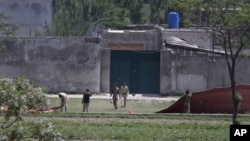One man with a unique perspective on the killing of Osama bin Laden and other counterterrorism efforts is Fred Burton, an analyst with the Texas-based private global security analysis firm STRATFOR.
Crucial information sources
According to early accounts of the U.S. military raid in Pakistan that resulted in the death of al-Qaida leader Osama bin Laden, U.S. intelligence agents were able to track him down through years of analyzing information gathered from various sources, including interrogations of other terrorists who were in custody. But information about the compound where bin Laden was living might have been provided by sources on the ground.
Intelligence analyst Fred Burton says he believes the key to the bin Laden operation's success was a human asset, a person or persons in Pakistan who provided information to the U.S. intelligence agents.
"Obviously, it was a beautiful counterterrorism operation," said Burton. "But in essence, the human asset that assisted in leading the counterterrorism team to the location is the real brilliance in this operation."
Money for info
Fred Burton began tracking terrorists in the mid-1980s when he worked with the State Department's Diplomatic Security Service, before going to work for STRATFOR in 1998. He says offering money for information on Osama bin Laden might have been crucial.
"I ran the Rewards for Justice program, which is the $20 million for bin Laden," Burton noted. "So there is no doubt that the individual who assisted in this matter has become a very wealthy man."
Burton says that if a person did assist U.S. intelligence in finding Osama bin Laden, that person and his or her family most likely have already been transported out of Pakistan to a safe location, where they have assumed new identities.
Raw intelligence
Having spent years working with other agents sifting through raw intelligence data for clues, Burton says fresh information gathered in raids like the one Sunday in Pakistan can be critically important in the war on terror.
"It has been my experience in these kinds of operations that you are going to have a tremendous amount of documents, papers, cell phones, possibly satellite phones, if not even a laptop that has been picked up," added Burton.
He says information gathered at the site in Pakistan where bin Laden was killed could lead to more U.S. military anti-terror operations.
Hiding in plain sight
For years, terrorism experts and international authorities had spoken of Osama bin Laden as a man on the run, living in caves and remote villages in the mountains of Afghanistan or in Pakistan's remote tribal regions. So it came as a surprise to many when he was located in a city in the heart of Pakistan, but not to Fred Burton.
"He was hiding in plain sight in an urban-like environment," added Burton. "Other al-Qaida high-value targets have been captured in the same way. So it does not surprise me that he was picked up in that environment. He has probably been there for a long time."
Fred Burton has authored two books about his work in tracking down terrorists, Ghost: Confessions of a Counterterrorism Agent and Chasing Shadows: A Special Agent's Lifelong Hunt to Bring a Cold War Assassin to Justice.
Informant's Tip was Crucial to bin Laden Operation, Says Analyst
- By Greg Flakus













